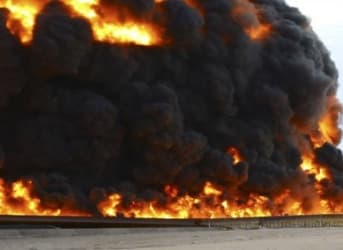Violence in a major oil producing country may finally halt the oil price slide.
Analysts have speculated whether the slump in oil prices would be reversed by an uptick in demand, a buying spree by investors in cheap commodities, or high-cost producers being forced out of the market. But it may be a sudden burst of violence in Libya that provides the spark to oil prices that the markets have been looking for.
Libya has experienced several waves of violence in recent years, violence that has caused periodic disruptions in Libya’s oil sector.
Prewar oil production topped 1.6 million barrels per day, a level that fell to nearly zero in early 2014. But violence receded in the summer as militant groups reached a political breakthrough with the internationally-recognized government. That allowed Libya to ramp up its oil output, contributing to market oversupply and the fall in prices.
Related: Emerging Energy Trends In Africa
However, the country’s fortunes have quickly taken a turn for the worse once again. Militants attacked Libya’s main oil export terminal in mid-December, launching rocket attacks on oil storage tanks. After two weeks of fighting, several storage tanks were set ablaze on December 25. Around 850,000 barrels of oil were destroyed in the fires.
Two major oil ports – Es Sider and Ras Lanuf – are shuttered due to violence. The government has already declared force majeure on the ports, citing the violence as a justification for its inability to export oil.
Then on December 28 the government launched airstrikes on the militant groups in response. And reports surfaced on December 29 that fires were raging at several oil storage tanks at the Es Sider port. The Libyan government requested assistance from the governments of Italy and the United States to help extinguish the blazes.
“Three fires are burning and three others have been put out,” Prime Minister Abdullah al-Thinni said by phone on December 29. There are a total of 19 storage tanks on site with the capacity to hold 6.2 million barrels of oil.
Oil production has fallen from 900,000 barrels per day in October down to just 350,000 barrels per day. Other estimates peg Libya’s oil production at just 230,000 barrels per day.
The turmoil in Libya may help oil prices rebound from their five-year lows. Futures for Brent crude were up 1.3 percent in intraday trading on December 29.
To be sure Libya is still a relatively minor oil producer compared to other countries, and the oil markets have no doubt come to see the country as an unreliable source of production when predicting future supply and demand. In fact, analysts are predicting that there will still be around 1.5 to 2 million barrels per day of excess supply heading into 2015.
Related: Oil Wars: Why OPEC Will Win
But it is not as if the 700,000 barrels per day or so that have been suddenly knocked offline in Libya are meaningless. That could amount to about a third of the glut predicted for the coming year, and given the uptick in prices on the news, keeping this oil off the market would certainly lead to higher prices.
Even still, it is far from clear if it will significantly move the needle on prices. On the same day as the Libyan government launched airstrikes, Algeria, a fellow member of OPEC, said that it was necessary for OPEC to step in and correct for the supply and demand mismatch. “For us, OPEC has to intervene to correct the imbalance and cut production to bring up prices and defend the income of its member states,” Youcef Yousfi, Algeria’s Oil Minister, said on December 28.
That is because despite the uptick in oil prices on news from Libya’s burning oil port, Brent crude prices are still hovering near five-year lows. It may take more than an outage in Libya to force oil prices back up in a major way.
By Nick Cunningham of Oilprice.com
More Top Reads From Oilprice.com:
- The Global Energy Security War
- Egypt And The Double-Edged Sword Of Cheap Oil
- Don’t Expect Low Oil Prices To Last For Long


















